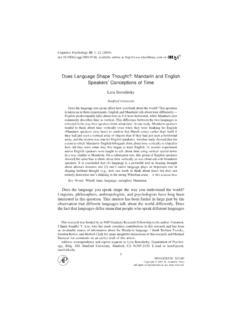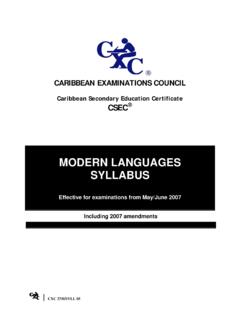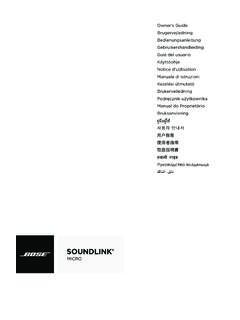Transcription of Lost in Trarclation - Lera Boroditsky
1 THE IIALI STREET JOURNAISATURDAY. JULY 2010, Dow Jones & Company, Inc. All Rights ReservedLost in TrarclationNew cognitiue research suggests thatlnngwqe proloundly infltrcnces thn wry peopln see the world,; adilferent sense of blnme in lapanese and SpanishNow, a flurry of new cognitive scienceresearch is showing that in fact, lan-guage does profoundly influence how wesee the question of whether languagesshape the way we think goes back centu-ries; Charlemagne proclaimed that "tohave a second language is to have a sec-ond soul.
2 " But the idea went out of favorwith scientists when Noam Chomsky'stheories of language gained popularityin the 1960s and'70s. Dr. Chomsky pro-posed that there is a universal grammarfor all human languages-essentially,that languages don't really differ fromone another in significant ways. Andbecause languages didn't differ from oneanother, the theory went, it made nosense to ask whether linguistic differ-ences led to differences in search for linguistic universalsyielded interesting data on languages,but after decades of work, not a singleproposed universal has withstood scru-tiny.
3 Instead, as linguists probed deeperinto the world's languages (7,000 or so,only a fraction of them analyzed). innu-merable unpredictable course, just because people talkdifferently doesn't necessarily meanthey think differently. In the past dec-ade, coglitive scientists have begun tomeasure not just how people talk, butalso how they think, asking whether ourunderstanding of even such fundamen-tal domains of experience as space, timeand causality could be constructed example, in Pormpuraaw, aremote Aboriginal community in Aus-tralia, the indigenous languages don'tuse terms like "left" and "right.
4 " Instead,everything is talked about in terms ofabsolute cardinal directions (north,south, east, west), which means you saythings like, "There's an ant on yoursouthwest leg." To say hello inPormpuraaw, one asks, 'Where are yougoing?", and an appropriate responsemight be, "A long way to the south-southwest. How about you?" If you don'tknow which way is which, you literallycan't get past a third of the world's lan-guages (spoken in all kinds of physicalenvironments) rely on absolute direc-tions for space.
5 As a result of this con-stant linguistic training, speakers ofsuch languages are remarkably good atstaying oriented and keeping track ofwhere they are, even in unfamiliar land-scapes. They perform navigational featsscientists once thought were beyondhuman capabilities. This is a big differ-ence, a fundamentally different way ofconceptualizing space, trained by lan-oltgaDifferences in how people thinkabout space don't end there. People relyon their spatial knowledge to build manyother more complex or abstract repre-sentations including time, number,musical pitch, kinship relations, moral-ity and emotions.
6 So if Pormpuraawansthink differently about space, do theyalso think differently about other things,like time?To find out, my colleague Alice Gabyand I traveled to Australia and gavePormpuraawans sets of pictures thatshowed temporal progressions (forexample, pictures of a man at differentages, or a crocodile growing, or abanana being eaten). Their job was toarrange the shuffled photos on theground to show the correct temporalorder. We tested each person in two sep-arate sitttngs, each time facing in a dif-ferent cardinal direction.
7 When asked todo this, english speakers arrange timefrom left to right. Hebrew speakers do itfrom right to left (because Hebrew iswritten from right to left).BY LERA BORODITSKYDo the languages we speak shapethe way we think? Do they merelyexpress thoughts, or do the structures inlanguages (without our knowledge orconsent) shape the very thoughts wewish to express?Take "Humpty Dumpty sat on "Even this snippet of a nursery rhymereveals how much languages can differfrom one another. In english , we have tomark the verb for tense; in this case, wesay "sat" rather than "sit.
8 " In Indonesianyou need not (in fact, you can't) changethe verb to mark Russian, you would have to marktense and also gender, changing theverb if Mrs. Dumpty did the sitting. Youwould also have to decide if the sittingevent was completed or not. If our ovoidhero sat on the wall for the entire timehe was meant to, it would be a differentform of the verb than if, say, he had agreat Turkish, you would have toinclude in the verb how you acquiredthis information. For example, if yousaw the chubby fellow on the wall withyour own eyes, you'd use one form of theverb, but if you had simply read orheard about it, you'd use a english , Indonesian, Russianand Turkish speakers end up attendingto, understanding, and rememberingtheir experiences differently simplybecause they speak different lan-guages?
9 These questions touch on all themajor controversies in the study ofmind, with important implications forpolitics, law and religion. Yet very littleempirical work had been done on thesequestions until recently. The idea thatlanguage might shape thought was for along time considered untestable at bestand more often simply crazy and PUBLISHER'S SALE OF THIS REPRINT DOES NOT CONSTITUTE OR IMPLY ANY ENDORSEMENT OR SPONSORSHIP OF ANY PRODUCT, SERVICE, COMPANY OR ORGANIZATION cusroM REpRt/vrs 609) 520-4x1 PO, Box 3oo PRtNcEToN, NJ 08543-0300.
10 Do Nor EDIT oR aLTER REPRINTS, REPRoDucrtoNs Nor PERMTTTEDDOWIoNES==Pormpuraawans, we found,arranged time from east to west. Thatis, seated facing south, time went left toright. When facing north, right to facing east, toward the body, andso on. Of course, we never told any ofour participants which direction theyfaced. The Pormpuraawans not onlyknew that already, but they also sponta-neously used this spatial orientation toconstruct their representations of many other ways to organize timeexist in the world's languages.






